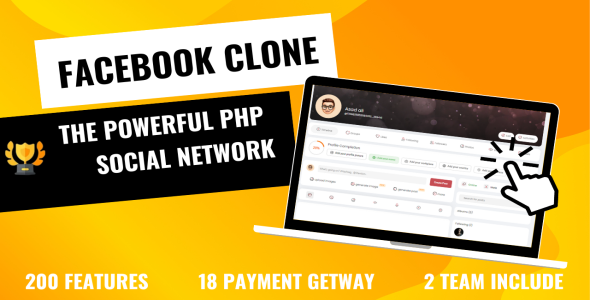
Latest Facebook Clone Script - The Powerful PHP Social Network Platform
Facebook clone is a PHP Social Network Script, Facebook clone is the best way to start your own social network website! Go To Buy Page
how can you protect yourself on social networking sites
To protect yourself on social networking sites, consider the following tips from various sources
Limit Personal Information: Avoid posting sensitive details like your address or daily routine. Be cautious about the information you and your connections share.
Be Mindful of Public Information: Check your privacy settings and be aware of what is public on your profile.
Use Strong Passwords: Create unique and strong passwords for each account to prevent unauthorized access.
Activate 2FA whenever possible to add an extra layer of security to your accounts.
Be Wary of Strangers: Exercise caution when interacting with unknown individuals online and limit the information you share with them.
Evaluate Privacy Settings Regularly: Review and adjust your privacy settings periodically to ensure they align with your preferences.
Avoid Sharing Identification Numbers: Refrain from sharing identification numbers or other sensitive personal details
Social Media SafetyWhat you choose to share on social media is always your decision, but what others choose to do with your information may not always be in your control. Consider taking the following personal safety precautions with these social media safety tips.
Know how to report, block, and filter content. Read Now how to filter which users or content you see, report harmful comments or content, and block those who are attempting to use technology to hurt others.
Personalize your privacy settings. Adjust your privacy settings on the site to your comfort level, and select options that limit who can view your information. Think about non-traditional social media as well, such as your public transactions on Venmo or music activity on Spotify. These site-specific security pages can help you get started.
<->Twitter
<->Instagram
<->Facebook
<->Pinterest
<->Snapchat
<->Tumblr
<->LinkedIn
<->Spotify
<->Venmo
Pause before you post. Before you post, ask yourself if you are comfortable sharing this information with everyone who might see it. Content that contains personal information or your whereabouts could pose a safety risk. Even content that is deleted can sometimes be accessed by the website or through screenshots of the original post and could be used maliciously.
Many social media sites or apps will request to access your location, but in most cases this isn’t necessary. You can still get the most out of your social media experience without sharing where you are while you’re there. If sharing where you are is important to you, consider waiting to tag the location until you leave. In addition to this, some sites may automatically make geotagged information public. When you “check in” on Facebook, update your Instagram story, or add a geotag to a Snapchat, these sites may share your exact location with people you may or may not trust with it. Take a look at the privacy settings on the sites listed above, or others you use regularly, to see what your location settings are and consider updating them.
Use a private Internet connection. Avoid public Wi-Fi connections, like those offered at coffee shops or airports, when using a website that asks for a password. Limit your social media usage to personal or private Wi-Fi networks, while using cellular data on your phone, or under the protection of a Virtual Private Network (VPN).
Pick strong passwords and update them frequently. This can help protect against someone who may be trying to sign on to your account for negative reasons like posting spam, impersonating you, or stalking. In addition to choosing strong passwords and updating them, remember to keep your passwords in a secure location.
